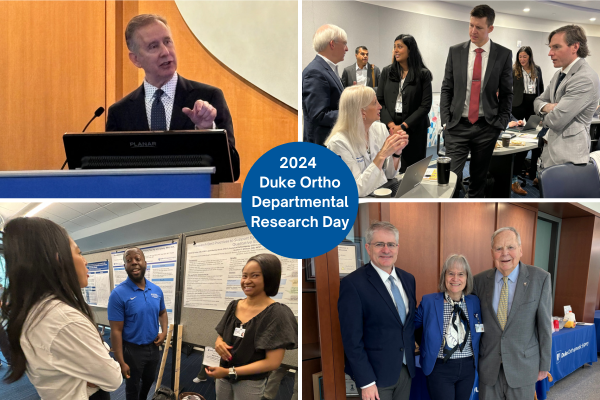
Faculty, residents, and students gathered for the annual Departmental Research Day to share innovative research endeavors underway.
Presenters featured:
- Precision rehabilitation for cardiometabolic disease
- Building pain equity through population health
- Uncovering age-associated changes of neuroimmune response during peripheral nerve regeneration
- Associations of vision impairment with cognitive impairment among stroke survivors
Visiting Branch Lecturer Richard 'Rick' Lieber, PhD, chief scientific officer of Shirley Ryan AbilityLab and professor at Northwestern University, provided information about his team's research studies, which are the first direct measurements of human muscle material properties.
The symposium theme, '100 Years of Duke,' took attendees on a tour of where we have been and where we are going in occupational therapy, orthopaedics, and physical therapy.
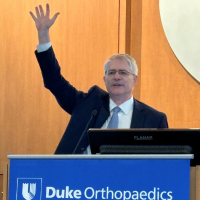
Department chair Ben Alman, MD, polled faculty within each division to list the most essential things in their field of study. Occupational therapy: device development; orthopaedics: arthroplasty, arthroscopy, internal fixation, and microsurgery; physical therapy: neuroplasticity in treatments; early mobilization; techniques to measure physical functions and education pathways; research: underlying biology that causes or contributes to disease and disorders; biomechanics and use in the management of musculoskeletal disorders; and education and research support.
Dr. Alman outlined the elements that have changed health in the past 100 years, including x-rays, antibiotics, and public health (vaccines and folate supplements). He said, "We are living well into our 80s and beyond, so things must adapt. We need to change how we deliver care, identify patients that benefit most from interventions, understand the pathophysiology of disorders, and develop biology-based and technology-based treatments to play a significant role. The people in this room will make these positive changes possible."
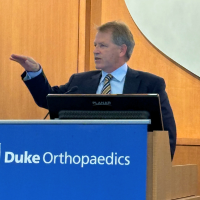
J. Leonard Goldner, visiting professor Todd McKinley, MD, professor of orthopaedic surgery at Indiana University School of Medicine, shared the essential historical points throughout the evolution of trauma treatments. "Most treatments in trauma history were tied to war. Our treatments and technology have arisen from the battlegrounds during WWI and WWII. Our goal remains to get bones to heal and to prevent infection. I agree with Dr. Alman that antibiotics and x-rays have played critical roles in the success of these efforts."
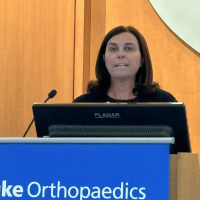
Tiffany Hilton, PT, PhD, program director and director of professional education, associate professor in orthopaedic surgery, from the first graduation ceremony in 1943, shared an amalgamation of the notable Duke Physical Therapy alumni over the years that included Elia “Emy” Villanueva’s clinical and academic career at Duke spanned four decades of which more than 40 years involved teaching students in Graduate School. Born and raised in Puerto Rico, Emy earned a BS at Mary Washington College (VA) in 1958 and completed a certificate in Physical Therapy at Duke University one year later.
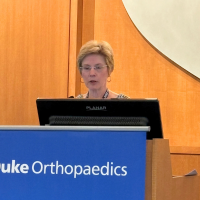
Amy Pastva, PT, MA, PhD, director of PT research and professor of orthopaedic surgery, relayed her predictions about how well Duke DPT research is poised for the future. "Looking at Duke's 110th celebration, we see exciting possibilities that involve strides in geriatric rehabilitation, preventative strategies, and personalized treatments. We must be proactive, embrace a holistic measure of success, and collaboration will be key."
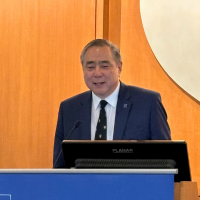
Michael Iwama, PhD, MSc, BScOT, professor in orthopaedic surgery, shared how the practice of occupational therapy (OT) began during WWI with 'reconstruction aides,' helping soldiers adapt to ordinary life after returning from the battlefields. "It was an era of moral treatment that provided compassionate treatment for people suffering from mental illness. However, the renaissance of OT occurred during the 1980s with the emergence of the scholarship of OT." Iwama was proud to share his personal joy stemming from the first commencement experience for the Duke OTD program on May 4 at the Duke Chapel. "It reminded us about why we are here as faculty members."
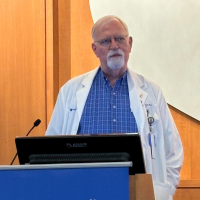
William Richardson, MD, featured the 'trailblazers' and the changing faces of Duke Orthopaedics. He featured Elroy Young, MD, one of the first African-American orthopaedic surgeons in Maryland. He received training at from Duke.
Born in Olmstead, Ill., he briefly attended Illinois State University in Normal before entering the U.S. Medical Corps in World War II and serving in France. He used the GI Bill to return to school, earning a bachelor’s degree in chemistry from the University of Illinois at Urbana-Champaign in 1946 and a medical degree from Meharry Medical College in Nashville in 1951.
Richardson also featured female trailblazers at Duke, like Alison Toth, MD, executive vice chair of the Duke Department of Orthopaedic Surgery and the first resident to become a faculty member. "We are moving in the right direction with efforts from faculty members like Erica Taylor, MD, and her work with the Student National Medical Association, and Melissa Erickson, MD's efforts with the Perry Initiative. I am excited and know that the next 100 years of Duke Orthopaedics will be more diverse."
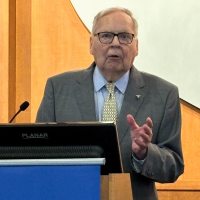
Concluding remarks were enthusiastically provided by past Duke Orthopaedic Surgery chair, James Urbaniak, MD. He quipped, "When they asked me to speak at a symposium featuring 100 years of Duke, I figured that I was the closest thing they had to 100 years."
He shared the gravity of the expertise generated by Duke orthopaedic surgeons and faculty members, such as more than 1500 successful re-plantations that have been conducted at Duke, our number one ranking of National Institutes of Heallth funding for research, faculty working with Olympic and professional sporting teams, and Ralph W. Coonrad, MD, revered and beloved orthopaedic surgeon and professor emeritus, developing the total elbow device in his garage and is still the 'gold standard' for treatment options to name a few.
"Duke Orthopaedics has a rich history. The future is bright. Keep it a 'go'!"